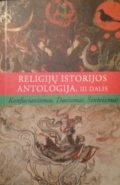 Composers:
Poškaitė, Loreta
Composers:
Poškaitė, Loreta Published in: Vilnius
Published on: 2002
Publisher: Vaga
Loreta Poškaitė – sinologist, orientalist, religious scholar, who has written lots of articles about Asia’s religion, mostly about Daoism. Based on her articles, in the year of 2002 the third volume of “Anthropology of the history of religions” about Confucianism, Daoism and Shintoism was published. Book is divided into three parts. Every part consists of introductory article about one of the religions, the fragments from the original “holy” book, or religion founder thoughts.
Confucianism, Daoism and Shintoism are ones of the most important religions in East Asia after Buddhism. Even now China’s government is based on ideas of Confucianism, and in Japan Shintoism is still important religion. Later these 3 religions had been changing, stealing ideas from each other, but mostly these religions had been mixing with Buddhism ideas that had been going through whole Asia.
We can call Confucianism more like philosophy, not religion because Confucianism is teaching us about human morals, how we should live our lives, pay attention to justice, individual and government morals. Confucianism shows us what kind of person we should be, what we should do to reach fullness of our lives. L. Poškaitė in the chapter about Confucianism consistently and in all details tells about the main point of this religion. Main object becomes the idea of “Yin and Yang” which symbolizes not differences in the world, like good or bad, white or black, but reciprocity. Author explains that all point of Confucianism is “Yin and Yang” and “Wu Xing” which means the laws of intercourse and of their existence. In other words, Confucianism is balance that a person has to seek. The thing that catches my eye in this part of the book is that there are words written in different style. Words that are written in different style usually are names of founders, books or religion, and sometimes summary words. This type of text style helps to concentrate more on the main idea of the text, or helps to understand more where and what kind of idea was said or published. It’s a good idea of putting the most popular religion teachers’ thoughts and doctrines because it lets us to analyse ideas ourselves. And in Confucianism there is few people who had different teachings and it lets us to compare their ideas, how they are similar to Confucius’ ideas and how they are different.
Daoism is religion-philosophy, and it has important place in Chinese people’s life and it lets to realize yourself in “celestial” sphere, because in this religion we can see God’s existence. Daoism shows the path (dao) to holiness, to perfection. As L. Poškaitė explained, Daoism is not just religion, it is teaching and faith at the same time. This religion objects itself and agrees, connects. In this part of book, there is no clear explanation about differences between celestial teaching and religion principles. Even though author gives at the same time complicated and clear explanation about Dao. It’s easier to say what Dao is not than what it is. While reading about Daoism we can understand that it is really interesting religion, which is hard to explain according to our religion standards.
While we talk about Shintoism, we need to talk about polytheistic religion. In past there was around 800 million gods, which could be found in any kind of thing. In many years Shintoism was effected by all religions, like Confucianism, Daoism, Buddhism, but instead of being pushed out by these religions, Shintoism adapted and took some religion aspects form others, becoming universal religion. In the book there is detailed explanation how Shintoism changed and how every religion had changed it. Detailed explanation helped to understand what kind of religion Shintoism was in the beginning and what religion it became in the end.
As it was mentioned in the book: “Every Chinese person at the same time believes in Confucianism, Daoism and Buddhism.” Confucianism helps to find right path when person is lucky. When misfortune comes, then person remembers Daoism, and before death, person starts to follow Buddhism ideas. And in Shintoism people are guided by gods.
